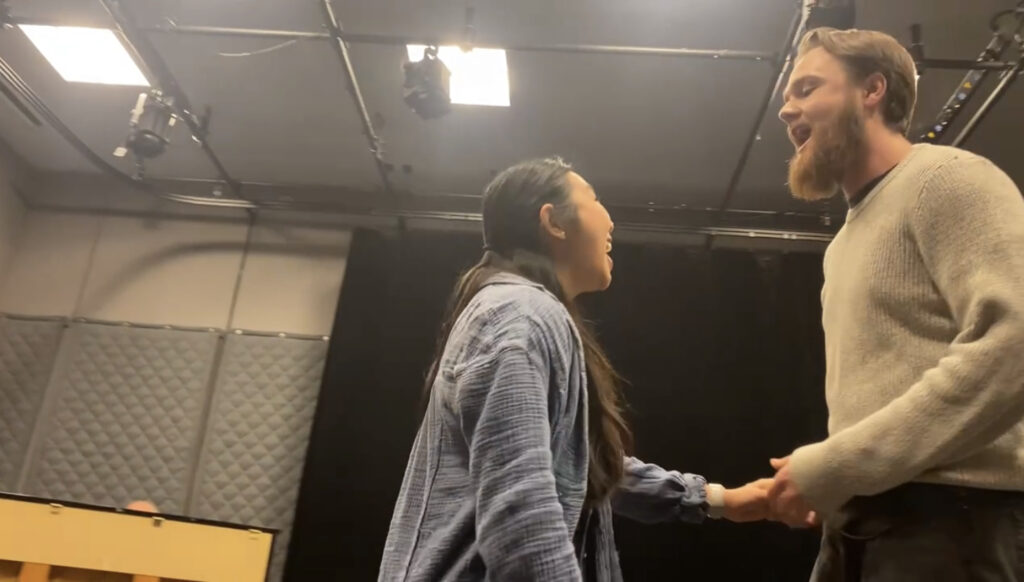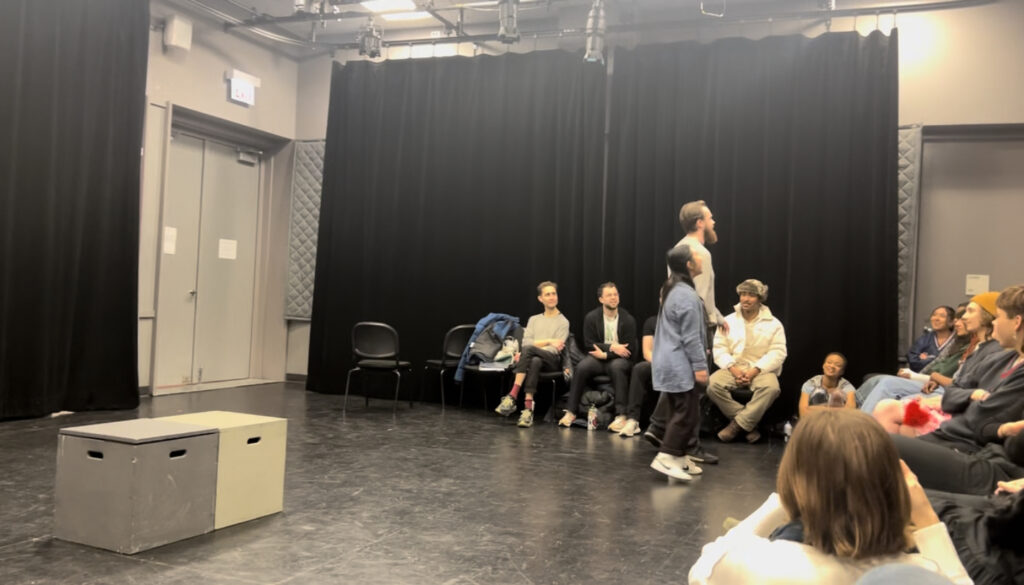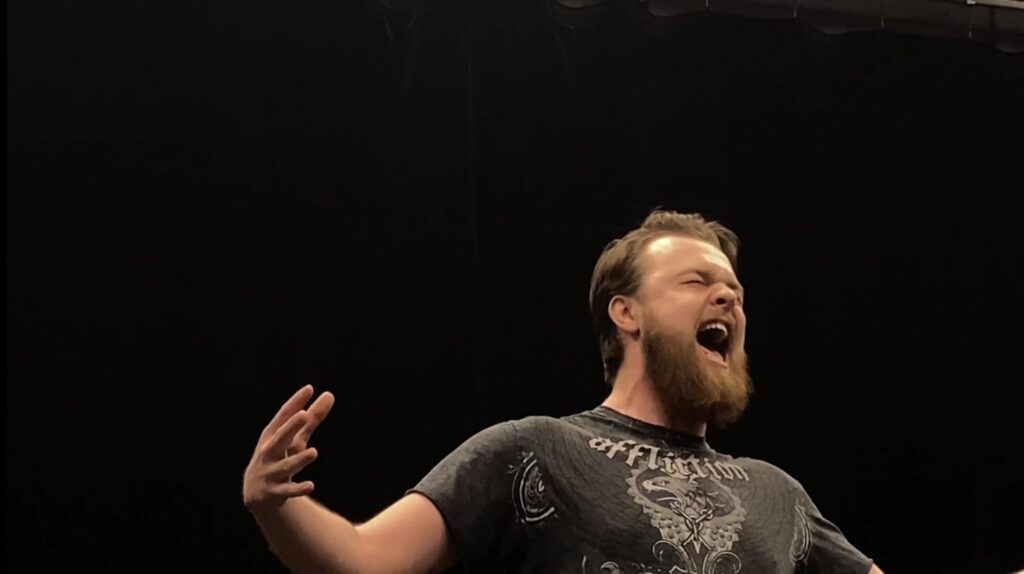Applying Writing Center Core Beliefs to Singing

I love to sing. In fact, I love to sing almost as much as Buddy the Elf does; however, not everybody shares the same feeling about singing as Buddy and I do. Many people have an extreme fear of singing in front of other people, being judged for the sound of their voice, cracking or messing up a high note, or even listening to their own voice being played back for them. Funnily enough, the same can be said for writing as well.
Don’t fret, my friends. These fears of singing and writing are similar, and surprisingly common. In this post, I will be dissecting Writing Center core beliefs into the context of singing, using my own experience as an actor, Musical Theatre performer, and music producer myself to describe how my own voice has grown over the last three years I’ve worked as a tutor.
Anyone who sings anything is a singer.
The labels we put on ourselves are simply tricks to try and “place” a human being into a category, like how food is labeled and shelved in grocery stores. Human beings are extremely complex, and I’m constantly encouraging myself to not think of people in terms of these labels. Yes, there is a difference between a singer who is a paid vocalist and one who is not paid to sing; however, who’s to determine our own passions, desires, hobbies, and activities other than ourselves? As tutors, we understand that you don’t have to be a published author, poet, or journalist to be considered a writer. The same is true with singing; you do not have to be a trained, paid, working vocalist to be considered a singer.
Of course, I’ve been singing since I was born. My parents helped pay for vocal lessons. I’ve done countless musicals. It’s easy for me to identify as a singer since it’s such an enormous part of my life. Yet, I believe singing is an enormous part of everybody’s life, just how music in general is. Whether you’re singing on a stage or singing in the shower, you may still be considered a “singer.”

I don’t want to beat a dead horse, but Merriam-Webster’s definition of a singer is simply this: “One who sings.”
There is no universal singing process that all singers (should) use.
How true is this? Vocal technique is vital, as singing can potentially cause vocal injuries if done incorrectly. One of my closest friends is currently pursuing a Musical Theatre degree, but she developed vocal nodules and hasn’t been able to perform at her full capacity since beginning recovery. I can’t pretend that there are no absolutes in the process of singing.
However, the same can be said for writing. While there is no universal process, there are some absolutes that can differentiate a really strong piece of writing to one that is unfinished. Such absolutes include: having well structured and clear sentences, a good organization of thoughts, stating and sticking to an argument, etc. As tutors, we’ve learned to identify common trends, errors, or missing texts that may hinder these absolutes from solidifying in their writing. These trends include: misuse or misunderstanding of punctuation, missing transitions between paragraphs, unclear thesis, etc. While all these trends and absolutes are present for every writer, they change from project to project. Hence, writers use different tactics and take different approaches in each essay to dismantle those trends and achieve those absolutes. A peer writing tutor may help identify trends and absolutes for writers, but it’s up to the writers themselves to implement these changes at their own pace and through their own processes.
Surprisingly so, singing functions similarly. Although technique is important, we always start with first drafts. Usually, my first draft of a song performance is okay, but definitely not finalized. Like with editing papers, my vocal coach and I will identify common trends in my performance that may hinder my ability to sing the song effectively or for the song’s message to be felt by the audience. Such trends include: holding tension in my body, not being properly warmed up, not being super familiar with the sheet music or the lyrics, not making acting choices, etc. By identifying these trends, I can then practice on my own to achieve the absolutes I need for a final performance. These absolutes include: relaxation, breath control, open throat, complete memorization of music and lyrics, clear understanding of the story being told, clear acting choices, etc.

Like with writing, the absolutes that are missing and the issues that I face with singing differ from song to song, performance to performance. Sometimes, my process is more focused on text analysis, using my acting skills to help me get out my head (actively thinking about how I’m singing) and into the emotion of the song. Other times, my process is more focused on repetition, playing around with different vocal inflections and tactics that match the vibe of the accompaniment. Despite all the absolutes of vocal health, it’s very clear that there is no right process to prepare a song. Every singer is different; every song is different.
And don’t forget: first drafts are always okay.
Singing facilitates communication and learning.
Well, singing facilitates a lot more than just communication and learning. I would also include emotion, love, vulnerability, etc. Musical Theatre directors have always told me that when a song starts in a show, the story being told is so important and emotional that the words cannot be spoken–they must be sung. Yet, there is something to the idea of boiling singing down to just “communication and learning” that may help encourage singers.
As a writer, “communication and learning” are ideas that simplify the goal of writing. In my opinion, writing should be about more than just getting a good grade in class. Writing is one of the healthiest tasks humans can do; we practice communication skills; we learn about subjects we write about; we overcome personal communication barriers; we learn more about how we function individually. In a way, we are literally communicating with ourselves when we write. Writing is a beautiful thing, and that’s one of the reasons why I love this Writing Center Core Belief. There is always a reason to write.
Now… many may not agree with me, but I believe that there is always a reason to sing. People are afraid of their own voice and what would happen if it doesn’t sound good enough. Yet, singing is another one of the healthiest things a human can do; we communicate emotions that cannot be spoken; we learn the stories and feelings that the song is about; we face, challenge, and can potentially overcome insecurities about singing that prevent us from communicating anything through song; we learn that we can sing at all. It’s an immensely brave thing to open your body, throat, and breath to let your voice be heard in its complete, unadulterated, and honest form. Yet, doing so may reveal more about oneself than any other form of creative expression. There are reasons to avoid singing, but those are most commonly in the name of insecurity and fear. Therefore, there are even more reasons to sing.
Collaboration among peers is an especially effective mode of learning.
&
All singers, no matter how accomplished, can improve their singing by sharing work in progress and revising based on constructive criticism.
These two beliefs go hand in hand. As writers, we understand that working with others allows us to hear our work in a new perspective. For example, hearing another person read our own writing aloud helps identify new trends in our writing. Other people have different perspectives of life, and engaging in those perspectives will only enhance our own.

This is the same with singing; however, singing in front of other people is far more scary than singing alone. In my Singing for Actors class at The Theatre School (TTS), we will workshop our solos and duets with our teacher in front of everyone in the class for about 15-20 minutes. Doing this helps us practice our performances in front of others, getting used to eyes glaring at us as we sing so openly and so vulnerably. One thing is extremely important to note, though: workshopping a piece doesn’t mean it’s in its final draft. As I stand to perform a song in front of my peers, I’m not expecting to fail, but I’m not scared of failing either. This is just rehearsal, not the final performance. Our professor will then discuss with me in front of the class about how I felt about my performance, what my task was, what changes I can make, etc. Then, we dive in again and I try to implement those adjustments. The act of doing all of this in front of others is extremely educational. We all have different comfort levels and experience with singing, but learning from other students can help us implement changes in our own performances that we may not even realize consciously. As with writing, my experiences as a tutor have dramatically changed my approach to writing my own papers–including this blog post. It goes to show that collaboration in all aspects facilitates an especially effective learning environment.
Another note on this: don’t be afraid to sing in front of others. It’s vulnerable and scary. Yet, I have a ton of experience with this, so trust me. Every time someone performs in front of others, no matter how much they may struggle, they are met with an audience that is extremely supportive of them for just doing it. No matter what, singing in front of others will always be met with love and support.
Singers produce songs in many different contexts using many different genres of singing. Understanding these contexts and genres can help singers as they sing.
From classical to contemporary, ballad to uptempo, musical theatre to pop songs, jazz to R&B, rap to rock… There are endless possibilities when it comes to the context and genre of singing. Of course, you may say that it isn’t endless, but I challenge that because new works of music are being produced every single day across the globe–new iterations of musical theatre, new blends of genres in award-winning albums, and most importantly, new stories to tell.
Writers will change their approach when writing fiction vs. non-fiction, a poem vs. a sonnet, a novel vs. a blog post, etc. They use work throughout history to inspire their writing, which sticks to the genre. Then, they enhance that writing through their specific story, which sticks to the context. Who’s to say that singing doesn’t function the exact same way? Vocalists and songwriters use work throughout history to inspire their music, but change and enhance it based on the story they want to tell. This of course applies to music creation and production; however, I also believe this applies to singing directly.

When I approach a classical piece of Musical Theatre, like “If I Loved You” from Carousel, my singing approach will be much different. My throat and body are far more open, spacious, and I sing with more vibrato. Yet, I have a different perspective on life than anyone else, and it’s my job as a performer to bring myself into this piece to make sure I’m not simply copying others’ performance choices. Hence, I bring my own context to the genre of singing. The same goes for when I approach a piece from a Rock Musical, like “Gethsemane” from Jesus Christ Superstar. I can’t sing with the same deep tonal quality that Carousel calls for; instead, the space I access in my body is more nasal, and I’m using breath support to add vocal fry and the grit that is necessary to tell the story of Jesus in that moment. Of course, this extends beyond Musical Theatre, as singing a Frank Sinatra song requires different strategies and stories than singing a System of a Down song.
Without genres, we wouldn’t have our favorite styles of music. Without context, we can’t use that genre to enhance and match the story being told. Every song has different specifics like this, but I strongly believe that they cannot be ignored.
What’s next?
The next step is simple: sing! Go home and sing your favorite song and put your heart into it and tell that story you love about it. The only way that I have been able to grow as a singer is by singing constantly throughout my life, particularly in front of other people. I always warm up before I sing, making sure that I have enough space in my body and throat to support these notes and not harm my vocal folds. I always have fun while singing, making new choices with my vocal inflection to match the vibe of the piece. I only know how to do this because I’m always doing it; the same way I know how to write in many contexts because tutoring has allowed me to continue to write in my life.
If you’ve read this far, thanks, and I wish you the best.
Is there a song within that you want to get off your chest?
Just because we are writers doesn’t mean we can’t sing, too.
Anyone who sings anything is a singer, and that includes you 😉

Discover more from UCWbLing
Subscribe to get the latest posts sent to your email.
